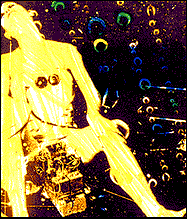| Nigel Ayers Interview | 1 | 2 | 3 | 4 |
|
You’ve said you’ve come from an art background, but it seems over time your skill as a keyboard player has developed over the years. Have you had any musical training? As far as the keyboard goes, I had piano lessons when I was a child, and then the keyboard was too big for my hands, and didn’t seem to make much sense. I’ve been experimenting with tapes since I was eleven or twelve – I was given an old Elizabethan reel to reel machine for a birthday, and made loops and sound effects with that.
I’ve spent thousands of hours in my studio working with keyboards, so it would be strange if my playing hadn’t improved. Can you describe the tape manipulation strategies of the early days? In the early days of NE, we used two tape loop devices: a Watkins Copycat with the erase head covered with the inside of a small sellotape reel to build up short endless loops, and a Roland Stage Echo to build up longer ones. We built a switching device that could mix and play snatches of sound from several cassette players at once. We recorded on either two or four track with lots of overdubs and I did a lot of tape splicing. Later we did a lot of work based on multi-track loops on a four track and eight-track reel to reel machine. So really we were using a sampler set-up before samplers were invented. This we used alongside an eclectic range of electronics, guitars, effects, percussion and vocals. What gear are you using today? I’ve never released a gear list before, here goes: Hardware includes: Acoustic instruments include: Any favourite painters you’d like to mention? Perhaps my favourite image-maker is Jan Svankmajer - that's one of his etchings on the wall - but he’s better known as a film-maker. I took a trip to the Art Brut Museum in Lausanne last summer which I thought was pretty amazing. For some reason I like painting with lots of obsessive detail in it - labour-intensive work. I like a lot of the stuff that’s published in Raw Vision magazine – you can find it on the Net. In the Sterile pages you’ve mentioned something along the line that many early industrialists became religious fanatics. And some even set up authoritarian cults of their own. The whole industrial scene attracted people drawn to the imagery of apocalypse, and this has become more popular in the run-up to the “Millennium”. Whether they were theists or drawn to some secular faith of extremist politics, I think many shared a fanatical mindset. This may have inspired them to make horrible records that only lunatics listened to. Perhaps it was down to them giving up rational thought -“industrial culture” is essentially absurd. So it would be easy for them to be drawn into some barmy cult or other. What is the “magick” aspect of your life? How would you describe your belief system? My record company advised me to emphasise the “magick” side of my music, in order to sell more records. I know this is a strategy adopted by many of the other groups they distribute and it seems to work for them. Personally, I don’t know that I have an aspect to my life that isn’t magick or even magic. As a practising occultist, I’d describe my belief system as sceptical.
What may we expect from Nocturnal Emissions for the future ? For the past year or so I have been working on the formula of "revolutionary industrial trance", drawing upon the work I largely abandoned in the mid-80s, but cranking up the breakbeat science a notch or two. This manifests itself in the form of pop songs - The MOST spiritual music! I'm doing vocals again- ha ha ha! If you want to hear it -there's a bootleg live CD circulating at present. I'm also continuing to do a variety of collaborations. The latest is with John Everall and Mick Harris.
Is there anything you haven’t done in your career that you’d like to? I’d like to concentrate more on my writing. I have a few ideas for books I’d like to see published, both fiction and non-fiction. And it would be nice to exhibit more of my visual work. At the moment I have a very busy recording schedule, another collaboration with Robin Storey, some kind of project with Stewart Home, so these are long- range plans. Any plans on doing some new touring? I’ll be doing some more shows in Europe in the Spring. Some day I’ll get something sorted out in the USA, I have been planning to tour there again for a while. |
| Site Map | Archive | Discography | Catalogue | Links | Network News | Home |
